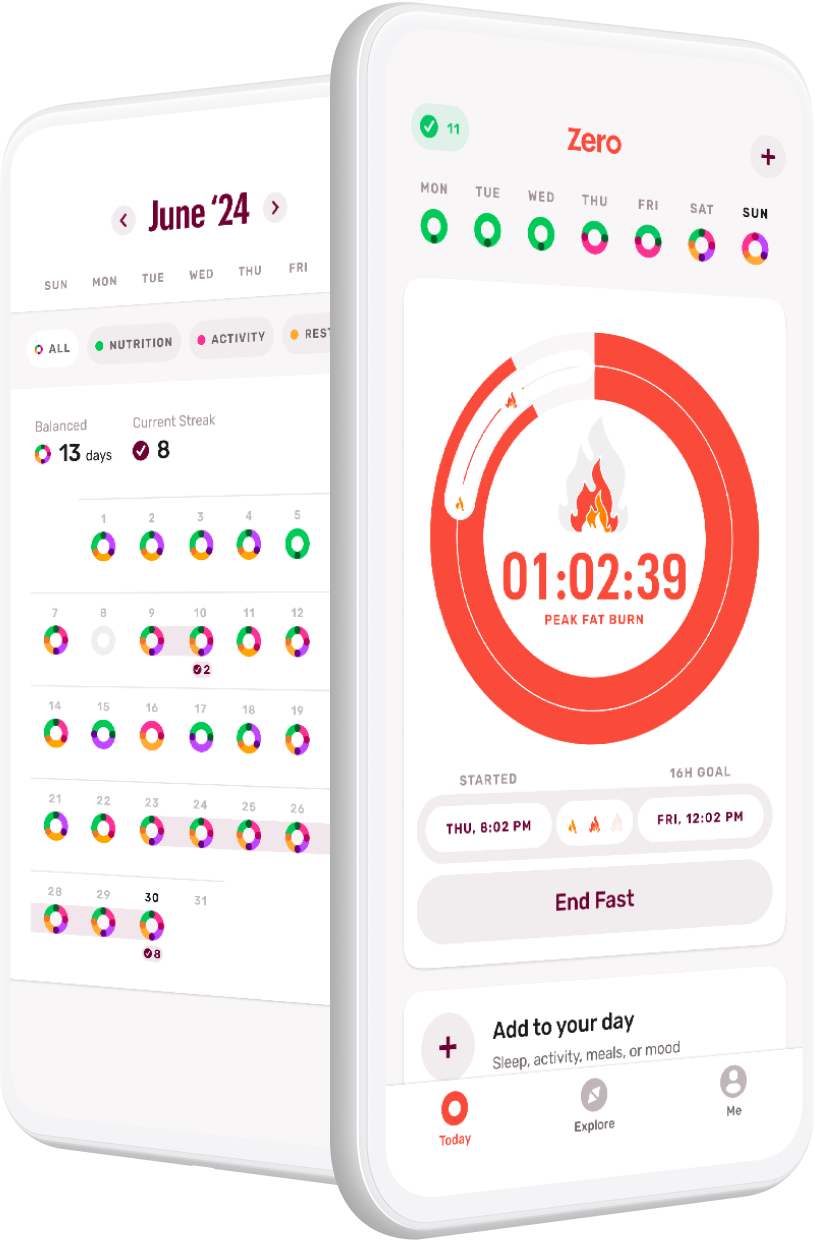Written and medically reviewed by Katya Meyers, RD
Family is often cited as one of the biggest obstacles to achieving health and fitness goals, and understandably so. No matter how you define the word, “family” undeniably involves prioritizing at least one person outside of yourself. For families with kids, there are soccer games to watch, pizza parties to attend, and numerous other commitments that squeeze the already-limited time you have to exercise. Then, there are all the less healthy items you wouldn’t buy for yourself but “have to keep on hand” for the little ones in your life. (Goldfish crackers, anyone?)
If these struggles sound familiar, you’re not alone. Although both marriage and having kids are associated with a longer lifespan, their impact on healthspan may be less rosy. Studies show an increase in calorie consumption and a decrease in physical activity for parents, especially those with small kids. Meanwhile, marital bliss is linked to improved food choices, but less physical activity and higher BMI.
But it doesn’t have to be this way. Family (and ensuing obligations) can also be a motivational factor in your health journey. Here are a few habits that you and yours can focus on to build health together.
#1. Make Meals and Food Prep a Healthy Family Affair
Families that eat meals together thrive together. Research shows that healthy family meals are a powerful opportunity to establish and model eating habits that can last a lifetime. More shared eating time is associated with a higher intake of nutrient-dense foods and lower rates of obesity. For example, a Harvard cohort study found that children who share dinner with their parents at least three times a week are twice as likely to eat the daily recommended five servings of fruits and vegetables, as compared to children of families who eat together less frequently.
And meal-sharing health benefits are not just limited to those with kids. Research shows that married couples eat less fast food and processed foods when they share meals, and a healthy shift in one partner’s eating habits are likely to extend to the other.
If eating together isn’t a healthy family habit yet, start with dinner a few times per week. Or, if family logistics and/or fasting schedules better align, make breakfast the family meal of the day.
Here are some more ideas for making nutrition a healthy family activity:
- Cook together. Eating home-cooked meals is associated with better health, including lower rates of obesity. Even young kids can help in the kitchen, where they’ll gain important culinary skills that will set them up for better lifelong eating habits.
- Shop together. As any parent who has had to navigate the cereal aisle with a small child can attest, a “quick” grocery run with kids is often anything but. Still, shopping together provides an opportunity to educate kids about the health benefits of food and allows them to develop agency around their choices — a very good thing, the research shows. To prevent the classic checkout aisle meltdown, ensure no one is hitting the store hungry, and set expectations by creating a healthy shopping list at home first.
- Start a garden together. Not only is gardening great for family bonding, but research shows that growing their own produce improves kids’ attitudes towards vegetable consumption. (More broccoli, please!) Nervous about your not-so-green thumb? Start with a small box of planted herbs, which will also lend color and nutrients to your family’s diet.
#2. Create Opportunities for Natural Movement and Make Exercise a Habit
As a parent, it can feel hard to justify the “me time” necessary for exercise. But here’s a statistic that is hard to un-know: Kids are twice as likely to engage in physical activity if a parent does so regularly. If both parents exercise, it increases the odds by nearly sixfold. Therefore, when it comes to modeling good habits, it’s important to exercise not despite our families, but because of them.
Now, don’t worry, you don’t have to train for a marathon or hit the gym seven days a week. Even just 10 minutes a day of moderate to vigorous exercise can substantially improve your life expectancy.
Here are a few methods to work more movement into your family’s routine:
- Focus on movement, not just exercise. Instead of watching your kids at the playground, play with them. Give your delivery guy a break and go shopping — yes, in a real store! Or head outdoors to explore a new trail or park, rake leaves, or shovel snow. Then, celebrate the day’s achievements with a living room dance party.
- Create traditions around more than just food. Holiday traditions, in particular, are often centered around what foods to eat and which gifts to give. But what if they involved movement as well? A Thanksgiving morning hike, winter ice skating, or a Fourth of July game of capture the flag are all ways to share joy with your family while getting everyone active.
- Make exercise part of date night (or morning). Look for ways to incorporate exercise into time with your loved ones. Instead of movie night on the couch, schedule a sunset stroll, a bike ride to coffee, or a walk on the beach.
#3. Prioritize Sleep
Healthy sleep is a cornerstone of health and wellbeing; it improves cognition, reduces stress, and lessens the risk of heart disease and obesity. Yet, as any parent knows, getting enough sleep can be hard to achieve once kids enter the picture. From the nighttime wails of newborns to the “why-are-they-late” anxiety over teenagers out at night, restful sleep is often in short supply. Indeed, research shows that parents sleep less than their counterparts. However, this deficit shrinks as kids age and equalizes by the time kids reach adulthood. (Though that may be of little consolation to anyone with a newborn!)
To try and shrink that deficit even sooner, make good sleep hygiene a healthy family affair. Here are some best practices to follow:
- Stick to a schedule. Set consistent bedtimes and wake times that allow for sufficient sleep, and try not to deviate much, even on weekends. Chronic sleep deprivation leads to metabolic dysfunction, such as weight gain and insulin insensitivity, that is not corrected by binge sleeping (i.e., sleeping until noon on the weekends).
- Get outside. Research shows that exposure to bright outdoor light, especially at dawn and dusk, creates an architecture for higher-quality sleep. When weather permits, eat family breakfast outside or get in the habit of sunset strolls with the family.
- Limit screen time. Studies show that screen time, particularly in the hours before bed time, reduces the quality and quantity of sleep. Therefore, develop family rules (that yes, even you abide by!) to limit screen time, and create your own family memories instead.
#4. Practice Gratitude and Stress Management
Despite the many joys of raising a family, few would deny that it can also be stressful. In fact, 73% of parents cite family responsibilities as a main source of stress. This can have a tremendous impact on health, as chronic stress is associated with cardiovascular disease, obesity, and depression.
Family stressing you out? No family is perfect, but oftentimes a little more relaxation is all that’s needed to diffuse the tension. Here are a few restorative habits to consider:
- Plan family vacations or breaks from your day-to-day routine. It doesn’t have to be a glamorous international getaway (although those work, too!); even a simple outdoor excursion, like a picnic or hike, can help alleviate stress. And you might just make a happy family memory while you’re at it!
- Cultivate a gratitude practice. Encourage kids and partners to share with you the best part of their day. (After that, then they can get into the challenges.)
- Resist the urge to overschedule. Give your schedule space for downtime activities like naps, quiet reading, unstructured play… and, yes, even alone time.
Conclusion
Change doesn’t happen overnight. Pick one or two healthy family habits to focus on, and build from there. Remember, even if your family doesn’t jump on board right away, modeling the behavior you want to see and starting your own health journey can have really positive downstream impacts. After all, while children don’t always listen to our advice, they rarely fail to imitate our habits.
- The Fasting Guide to Menopause, Perimenopause, and Postmenopause - April 8, 2024
- Try This Instead of That: How to Bookend Your Fasts - March 25, 2024
- 60 Names for Sugar: The Myths, The Facts, and What You Should Know - February 12, 2024

